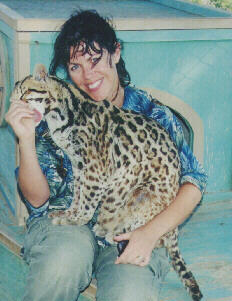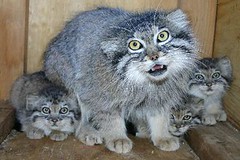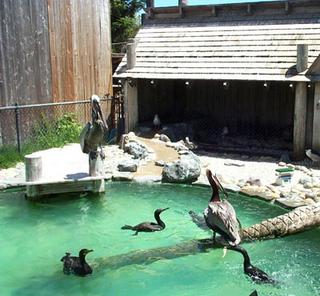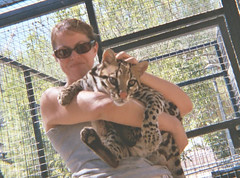Murder For Hire

I'm currently working on rewrites for my mystery novel, Murder For Hire (henceforth known as MFH). I've been working on MFH in one incarnation or the other for over 15 years now. It started as a joint project with my old writing partner, Maureen. We ran a theatrical mystery troupe (also called Murder For Hire) in San Diego for several years, and used to...
Well, I'll just use the description from my novel (a description which accurately portrays the real MFH troupe and the fictional one as well): "MFH is a theatrical group dedicated to parodying various genres in the mystery field. Our floating troupe of actors can and have done just about everything in the way of mystery-oriented entertainment. We've done full-out murder mystery weekends, staged kidnappings at parties, and pastiched, parodied and lampooned everything from gothics to Sherlock Holmes. No author, however revered, is safe from our heavy-handed pen and sometimes sledgehammer humor. "
It was a lot of fun. We once hired out Molly the Trolly (the local cable car), loaded our paying guests onto it with several actors already in costume and character, then proceeded to various points in San Diego to pick up the rest of our cast (for instance, the Big Game Hunter was waiting in front of the San Diego Zoo). One of the paying guests was actually a shill; we'd persuaded a friend to be our murder victim. We'd given Jeanne a box of chocolates as both a bribe and the means of her death (poisoned chocolates being a time honored murder weapon in the cozy mystery genre). We didn't count on the other passengers trying to extort chocolate from her. I have a vivid memory of Jeanne glaring fiercely at everyone around her as she clutched the box of chocolates possessively to her chest. No one else got any of the chocolate and none of 'em were sorry when she 'died' either.
MFH's specialty was a piece called "The Peruvian Pigeon" (if you can't figure out which classic noir mystery we were lampooning, I ain't gonna tell you), which we performed in a number of venues. It was the centerpiece for La Jolla's first Raymond Chandler Festival (Chandler was a well-known public figure in La Jolla during his heyday), the main entertainment for the big Gala Dinner held at the new La Jolla Library. Mo and I got along great with Bill, the head librarian and mastermind behind the entire Chandlerfest, but butted heads with Maggie, the woman in charge of the Gala. We weren't professional enough for her tastes and she tried her best to get us fired after attending a blocking rehearsal. I lost my temper and told her off, we didn't get fired, but Mo and I still wanted to kill her. Literary vengeance is a great creative motivator and so, MFH - the Novel, was born.
Mo and I split up the chapters and wrote in two different character voices, "Daphne" and "Connie," both thinly disguised fictional versions of ourselves. Okay, 'thinly disguised' as in wearing saran wrap. While it's true that the best writing usually happens when the author is working from things and places that he/she is familiar with (a place of truth, to be all hoity-toity pompous about it), it's also possible for a writer to be WAY too close to the subject and lose any and all sense of objectivity. And so it was with me and Mo.
We'd exchange chapters for the other's critique. Great glaring plot holes and ridiculous stereotypes were forgiven, even overlooked, but have Daphne wear jeans with a sweater? "I would NEVER wear that!" Mo would haughtily insist. "Well," I'd snap back, "I would NEVER be as bitchy as Connie is in YOUR chapter!" "Well, Daphne wouldn't do this!" "Well, CONNIE would never do that!" And so on. Never mind that in order to advance the plot, Connie and/or Daphne would indeed wear, do or behave in the contested clothes/action/behavior. Mo and I didn't care. Yeah, let's just say that there were two major problems: our egos.
We were about three quarters finished when we got the bright idea of sending out query letters to publishers. Anyone familiar with the publishing industry and the wait time between sending out a query and actually receiving a reply will understand the irony involved when I tell you that two weeks later, we got a letter from an editor at St. Martin's Press. Not a rejection letter. He wanted to see the finished novel as soon as possible.
Gulp.
Fueled by dreams of literary fame, lots of sugar, and white zinfandel (this was before either Mo's or my taste buds matured enough for red wine. Heck, this was back when I thought all red wine came in a box that had 'Burgundy' and 'Gallo' on it), Mo and I had three late night marathon writing sessions to finish our first draft. Mo didn't type in those days, so I hunkered down over my stepdad's word processor (something you'd now find in Ancient History museums, complete with its dot matrix printer) and pounded the keys, while Mo sat at my side and gave her input. About 3:00 in the morning, that would be along the lines of, "So if you were a supermodel, which one would you want to look like? I'd be Cindy Crawford." My reaction would alternate between "Gee, that's nice, Mo," to giving her questions thoughtful and serious consideration, to screaming hysteria "We're never going to finish! This is stupid! AHHHHH!"
And yet, somehow we got it done. Sent it off in a white cardboard box with a self addressed stamped envelope and the certainty that we'd be published authors within the year.
Ahem.
So 15 years and many solo revisions later, the most notable changes are: one author and one 'voice' . Mo lost interest and Connie took over all the narration; an improved, more mature writing style; and an ability on my part to separate myself from not only 'my' character, but the past. Sometimes the truth does not make the best story nor the author(s) the best heroine(s). And now I'm working on yet another round of rewrites to 'up the mystery.'
Let me quote MFH (The Novel) again: "The fact of the matter is that neither Daphne nor myself are any good at intricate plotting or figuring out solutions to the most simplistic Whodunits. Grafton or Christie we are not. I mean, let's face it. Whenever we're stymied as to explain how our detective came to his conclusions, all we have to do is have him toss off nonchalantly, 'I had a hunch.' "
This description definitely comes from a 'place of truth.’ Mo and I had originally circumnavigated our mystery plotting/solving inadequacies by having our characters gormlessly stumble across clues, all the while trying to avoid anything to do with playing detective. It worked in a plot-as-light-as-a-soufflé kind of way, but didn’t, according to an editor, ‘leave the reader with the impression that as each chapter progressed, they were that closer to figuring out whodunit themselves.’
This same editor, however, liked my writing ‘voice’ well enough to say that she’d consider MFH for publication if a: I was willing to do some more revisions and b: they were what she wanted.
And so, here I am. I started reworking MFH about a year ago, read the whole thing again from start to finish, made notes, came up with a game plan that seemed to work. But I made the mistake of stopping midway through the rewrites to work on another project and I’m now finding it very difficult to remember what it was about my ideas that I thought would work.
I re-read the whole book. Again. And I think I’m circling back in on the solution, although it keeps slipping away every time I’m sure I’ve got it in my sights. I’ll work for a little while, get stuck. So I’ll turn away from it and nonchalantly check my email. Circle around for another go at it. Get a little closer. More frustration as that sense of certainty that I had just a few minutes ago scampers into hiding yet again. I’m sneaking around like a cat trying to hone in on its prey without being noticed. And sooner or later I’m gonna pounce at just the right time and get it right.





 Photo of a Murre, by Patrick J. Endres
Photo of a Murre, by Patrick J. Endres


